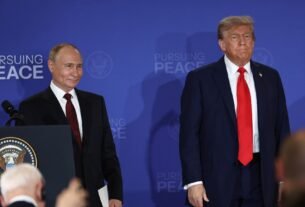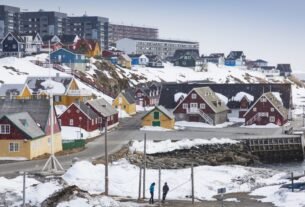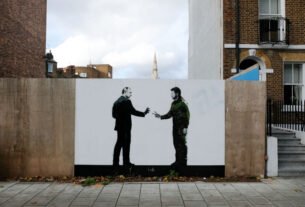Good morning, and welcome to The Capitals. This is Eddy Wax, with Nicoletta Ionta. Got a tip, rumour or story idea? Drop us a line by email – or, for the more discreet, via Signal at @EddyWax.94
Today’s edition is powered by AIJN European Fruit Juice Association
100% fruit juice:
A unique and healthy composition that supports healthier diets across Europe. Highly regulated with no added sugar by law, recent scientific research has revealed new health benefits.
Read more about AIJN’s vision for a healthy and sustainable future here.
In the capital
The biggest story in Europe in the coming days will be Ukraine. After months of cajoling, pandering, and flattering, Europeans sense they’ve convinced Donald Trump to muck in on protecting Ukraine from further Russian attacks after the war.
Debate over the post-war security guarantees Europe might extend to Ukraine has intensified in recent weeks, fuelled in part by this month’s US-Russia summit in Alaska, which stirred tentative hope for a peace deal.
Now, as defence and foreign ministers descend on Copenhagen for the next few days, and parallel moves are made by the so-called “Coalition of the Willing” – states led by France and Britain to offer security assistance of some kind to Ukraine – the Europeans will try to flesh out just how those guarantees should work in practice.
A peacekeeping force has been floated, but its shape remains opaque. Trump, for his part, has signalled willingness to help, but he won’t send troops.
It’s a moment of truth for European countries to stump up, as they push to get President Volodymyr Zelenskyy in the strongest possible negotiating position for future peace talks with his Russian counterpart, Vladimir Putin.
Italian PM Giorgia Meloni has been touting a new European security architecture inspired by NATO’s mutual defence clause, but there’s little understanding of how that would work. The general parameters would likely mean beefing up Ukraine’s army and getting an American backstop for a “reassurance force,” composed mainly of European soldiers stationed far from a frozen frontline.
Military chiefs will meet today to keep hashing out a draft framework of the guarantees. Then, national security advisors should finalise it within days, before leaders make the final call.
Less than half of the 30-strong Coalition of the Willing are open to sending troops, reports my colleague Charles Cohen in this must-read piece on who’s offering what. Others have suggested different kinds of support: watching the skies, sending ships, providing operational guidance, easing logistics, training staff, and even opening their military bases to troops.
The sad truth is that, regardless of how many details emerge from the European side in the days ahead, the end of the war or even a truce remains stubbornly out of reach. Without that, finessing the security guarantees is, at best, an academic exercise.
Russia is playing for time and has already cast European and American security guarantees as a non-starter. A trilateral summit between Putin, Zelenskyy and Trump is still a distant prospect. While the precise contours of US involvement are unknown, EU officials don’t see Russia taking any steps to end the war.
Donbas remains the core linchpin. For Putin, control of Donetsk and Luhansk is essential, both to sell the war as a victory at home and to strategically hold Kyiv vulnerable. For Zelenskyy, surrendering the region is politically and militarily untenable, it is where many Ukrainians trace the war’s origins. Losing it would devastate morale and weaken its defences.
Ursula von der Leyen, leading a more diplomatic kind of reassurance force, will head to seven eastern EU countries starting Friday, including Finland and Romania, in a trip focused on boosting Europe’s defence capacities.
Antonio Costa gets his own (The) Capitals tour
The EU Council President is hitting the road over the next three weeks. He plans to meet all 27 EU leaders individually before heading to New York later in September for the UN General Assembly. The goal: discuss political priorities on their home turf and shape Council action in the months ahead. The tour kicked off in Belgium with Bart De Wever on Wednesday.
According to an official, next week’s stops include Slovenia, Croatia, Austria, Romania, Bulgaria, Czechia, and the Netherlands.
Parliament curbs lobbyist access during recess
The European Parliament will restrict lobbyist access during recess, according to a communication circulated on Tuesday. From next week, interest group representatives will need an invitation to access the EP during quiet weeks, off-plenary Strasbourg, MEP office zones, or peripheral sites. “Invitations can be issued only by MEPs,” one EU Parliament official said.
How the new rules will be enforced remains unclear. The Parliament had no details to share at the time of publication.
Since May, policy advocates have also been required to activate their badges daily at new terminals at Parliament entrances, as part of the Parliament’s push for greater transparency – a move that has sparked pushback from industry groups.
Emma Brown, the president of SEAP, which represents EU public affairs professionals, called the measure “understandable” but slammed the rollout, saying the announcement created “confusion.”
According to the official, some individuals will be required to obtain a new badge under the updated rules. While the rollout of the badges will happen gradually, access rights will be adjusted immediately once the rules take effect on 1 September.
“Once again, actions are taken without consultation with the profession – a performative approach that adds little to real transparency while undermining trust,” Brown added.
De Wever ‘stupid’ to block Schuman roundabout funding
Belgian PM Bart De Wever was “stupid” to shoot down the Brussels government’s request for more EU money to renovate the Schuman roundabout, said Alain Hutchinson, a regional appointee whose job is to liaise between the Brussels Capital Region and the European institutions.
Hutchinson told The Capitals that European institutions have not replied to the Brussels ministers’ request for millions in extra funding – suggesting this was because they did not want to get into conflict with De Wever who described the request as a “disgrace” and a “total humiliation.” Hutchinson said: “For him it is just one more reason to talk badly about Brussels.”
The funding hitch might mean that the project’s pièce de résistance – an awning over the roundabout – could be delayed, according to Hutchinson, a former Socialist MP.
Berlaymont black box?
The Commission is yet to release the 2025 management plans, which outline how its directorates-general intend to carry out the executive’s political objectives. Normally published at the latest in May, the Commission has promised a collective release of the annual plans, and some are still being finalised. In recent years, the executive has become less transparent, notably reducing the number of officials named on its “Who is Who” registry.
The capitals
BERLIN
Friedrich Merz has unveiled a new National Security Council, merging two existing bodies to streamline crisis response and long-term planning. Officials say the council will form the “nucleus” of Germany’s security architecture, bringing together ministers, security services, and allies like NATO and the EU. Berlin has also launched a revamped military service scheme for 18-year-olds, the first step in its drive to rebuild the Bundeswehr and keep conscription on the table.
PARIS
With a confidence vote approaching, PM François Bayrou faces mounting pressure to step aside. Recent polls show most voters not only want him to resign but also favour dissolving parliament – and even President Emmanuel Macron’s departure. Bayrou’s €44 billion savings plan and summer-long campaign to sell it have flopped, with most French deeming the budget unfair.
ROME
Meloni on Wednesday struck a critical note on Gaza, warning Israel’s response had gone beyond proportionality and risked undermining a two-state solution.
CHISINAU
EU leaders Emmanuel Macron, Friedrich Merz and Donald Tusk talked up Moldova’s chances of joining the EU and bashed Russian interference in an upcoming 28 September election, in a joint trip designed as a flashy show of solidarity with Europhile President Maia Sandu. The EU fears Moldova will fall deeper into Russia’s sphere of influence, like Georgia.
BRUSSELS
Belgium’s coalition remains deadlocked over Israel and Gaza. At Wednesday’s core cabinet meeting, ministers failed to agree on a common position. Progressive partners Vooruit, CD&V, and Les Engagés are pushing for a tougher line, while MR and N-VA are urging caution. The debate is set to continue at Monday’s cabinet session.
THE HAGUE
PM Dick Schoof survived a vote of no confidence in the House of Representatives on Wednesday. The motion, triggered by disputes over tougher measures against Israel amid the Gaza war, won the support of just six of 150 lawmakers. On Friday, the centre-right New Social Contract party quit the coalition over the same Gaza row. The country is set to hold snap elections on 29 October after Geert Wilders’ far-right Party for Freedom pulled its support for Schoof’s government in early June.
MADRID
Energy Minister Sara Aagesen told the Senate that her ministry’s fire prevention budget has grown by 50% since 2018, deflecting criticism of the country’s handling of the devastating wildfires amid allegations that prevention efforts were underfunded. Spain’s main opposition, the right-wing Popular Party, had summoned four ministers to parliament this week over what its leader Alberto Núñez Feijóo has called a “slow” and “inefficient response.”
WARSAW
In their first major clash, PM Donald Tusk vowed to push ahead with wind power even after President Karol Nawrocki vetoed a law easing wind farm rules. Tusk said wind is Poland’s cheapest energy option, while Nawrocki, who took office earlier this month, campaigned on defending coal as the country’s “black gold.”
PRAGUE
Only 14% of Czechs have heard of the EU’s Digital Services Act, a flagship EU regulation setting rules for digital platforms to ensure a safer online environment, according to a new survey. Awareness in Czechia ranks among the lowest in Europe, alongside Slovakia and France, while Hungary, Finland, and Germany scored higher.
BRATISLAVA
Slovak prosecutors and the country’s election commission are investigating President Peter Pellegrini’s 2024 campaign over undisclosed loans and allegations that he overspent the legal limit by at least €250,000. His party, Hlas-SD, has admitted to breaching disclosure rules, while Transparency International warned that the irregularities may have handed him an unfair victory.
Also on Euractiv
North Macedonia’s tanks, Albania’s aid, Serbia’s quiet ammunition transfers: the Western Balkans are stepping up where Europe stalls.
Their industrial base and battlefield solidarity reveal a region already woven into Europe’s defence fabric, writes Ioannis Armakolas, director of the Hellenic Foundation for European & Foreign Policy, and Ana Krstinovska, senior researcher at the foundation’s ‘thinknea’ initiative, in their latest op-ed – which makes the case that enlargement is not a gift, but a strategic imperative.
As France fumes over the EU-US trade deal, Trade Minister Laurent Saint-Martin has signalled openness to Chinese investment.
At a Paris business forum, he backed the idea of closer economic ties with Beijing, but stressed that investments should be sector-specific, tied to technology transfers, and involve joint ventures. The remarks, which came as China’s envoy urged closer ties, underscore Paris’ shift in posture between Beijing and the Washington.
Entre nous
Activists read out the names of 69,000 Palestinian and Israeli victims of the war between Israel and Hamas near the Schuman roundabout on Wednesday.
Agenda
- Informal meeting of defence ministers in Copenhagen
- Mark Rutte to attend a CDU-CSU and SPD parliamentary group conference in Würzburg at the German Bundestag
Contributors: Alexandra Brzozowski, Aurélie Pugnet, Inés Fernández-Pontes, Aleksandra Krzysztoszek, Aneta Zachová, Natalia Silenska
Editors: Christina Zhao






